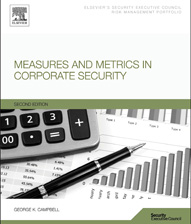Why do you open this magazine? I don’t want to press you too hard on that question, because so long as you keep doing it, that’s fine by me. But why do you? To learn something you wouldn’t otherwise. To be more informed so that you can do your job better, and when you meet someone, you don’t feel a clot when they tell you some piece of news and you have to admit you don’t know and ought to. We go through life picking up knowledge; it doesn’t stop when we leave school or university. In fact, that’s when it really starts!?
But it’s not any old knowledge. It has to be useful, and you have to apply it. That is why I have found so interesting a book that I admit is new to me, though it’s come out in its second edition: Measures and Metrics in Corporate Security, by an American, George Campbell. It’ll be reviewed in the October magazine; meanwhile I have included a slice of it on page 43, because it seemed to go well with the previous two articles. An interview with a senior police officer in Glasgow about the security and planning before the Commonwealth Games (page 36) and what the new Wilson James security services MD Gemma Quirke had to say (page 42) – and indeed what she and others said at a panel of guarding executives at IFSEC, featured last issue. All seek answers, implicitly or explicitly, to the same questions. How to judge how well you are doing? How to measure value? What are the right metrics?
It’s easy for a factory. If you make a thousand a month of a product, good. Two thousand a month, better. If you are providing a service, how can you price it? And, more to the point, win over the customer to paying ten pence (!) or whatever an hour more, for your service? Some services have it easier than others. You only have to run your finger along the washbasin to see if it’s clean or not; but how to measure whether the room or a building is secure?
There are more questions there than answers, I appreciate. Also to bear in mind is that people seem to regard smartphones and computers the same as cars and television sets, or indeed a light bulb. They expect to switch them on and they work. If they don’t come on, then they have to be repaired; but once repaired, people expect to use them without having to worry about malware or hacking or denial of service or whatever. Hence people insist on using WiFi even though it’s been well known for years – and as reported in Professional Security – that it’s not secure (page 16). That’s wilful and irresponsible, and perhaps causing trouble for workplaces. It may be human nature and beyond rectifying – but until you know about it, and get some metrics, you can’t act on it.









